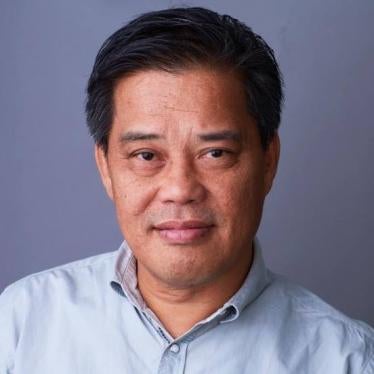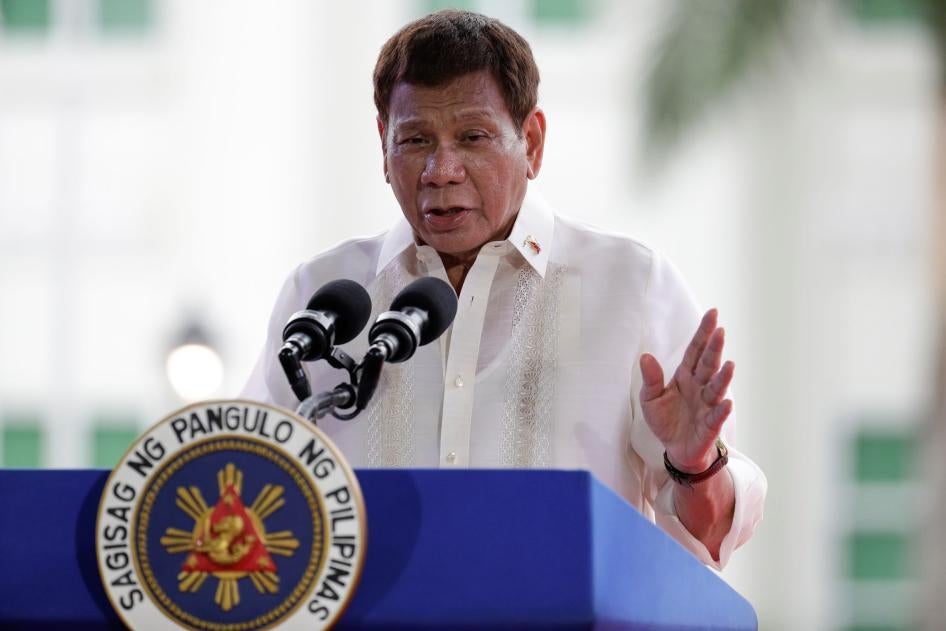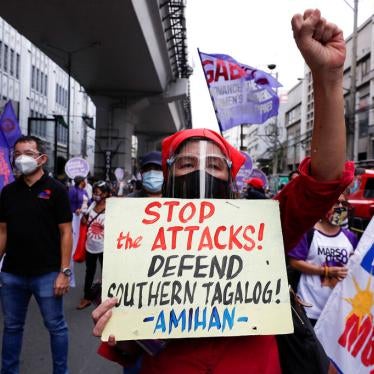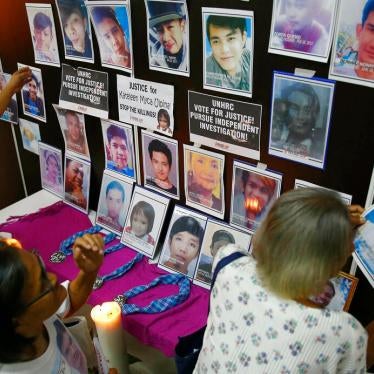Clarita Alia remains anguished, nearly 20 years after I first heard her express her grief.
“His name was Danilo Lugay,” she told me over the phone recently from Davao City, in the southern Philippines. Police killed Lugay in September 2020 during a drug raid; a news report of the killing said he had fought back and police officers shot him. Lugay, 28, was the grandchild of Alia’s sister Naneth.
Alia’s voice cracked as she described what happened — the same pained voice that I heard when I interviewed her in 2002 for a report on the killing of her sons Richard, Christopher and Bobby, all teenagers. Assailants later murdered a fourth son, Fernando, in 2007. This unimaginable family tragedy gave Alia, a vegetable vendor who lives in a slum community, the label of poster mother for the city’s bloody “war on drugs,” in which police use extrajudicial executions instead of prosecutions as a primary method of punishing criminal suspects.
At the center of all this violence is Rodrigo Duterte, the longtime mayor of Davao City who parlayed his tough-guy image into a potent political force that got him elected president in 2016. Many Filipinos love, adore and make excuses for his steady stream of crude, unrestrained remarks using the pretext of law and order to sell his “drug war.” They believe that he is the leader who — after decades of political dysfunction, corruption, insurgency and growing crime — can turn the Philippines into “another Singapore.”
The cost of Duterte’s anti-drug campaign has been high. Since 2016, police and their agents have killed at least 6,000 people — but likely closer to 30,000 — across the country. Human Rights Watch and others, including United Nations High Commissioner for Human Rights Michelle Bachelet, have expressed alarm about the government’s systematic campaign of violence and disregard for due process, in which, according to reports, police routinely plant guns and drugs on bodies to justify their claim that suspects “fought back.”
Rampant impunity has long protected Duterte and other officials from prosecution in the Philippines for serious rights abuses. But Duterte appears to have feared the reach of international justice. Soon after the February 2018 announcement by then-International Criminal Court prosecutor Fatou Bensouda that her office was closely examining allegations of crimes against humanity during the president’s “drug war,” Duterte ordered the country’s withdrawal from the ICC.
Killings committed since Nov. 1, 2011, when the Philippines joined the ICC, are within the ICC’s jurisdiction, including those in Davao City. Duterte’s efforts to evade ICC prosecution shields him and other officials only from killings after March 2019, when the withdrawal took effect. But Alia’s sons were killed in 2001, 2002 and 2007, while Duterte was mayor. Lugay was killed in September 2020. All are outside the ICC’s jurisdiction.
“Why can’t our cases be investigated?” a distraught Alia said on the phone. “What will happen to us?”
It’s a question that thousands of Filipino families ask each day, as Duterte’s “war on drugs” rages. The current anti-drug campaign nationally has many similarities with Duterte’s brutal campaign in Davao City, where petty criminals, including street children, were shot or knifed to death, as in the case of the Alia teenagers. The killings, which other cities have also copied, continued during Duterte’s last term as mayor there, from 2013 to 2016.
But even with the limits on ICC prosecutions, there is now some hope that those responsible for the thousands of drug war killings may face consequences. On Sept. 15, the ICC formally opened an investigation into allegations that Duterte committed crimes against humanity. This is among the most hopeful news for human rights in the Philippines since the fall of the dictator Ferdinand Marcos in 1986.
Duterte, who announced his retirement from politics this weekend, is evidently rattled. He has lashed out at international bodies such as the U.N. Human Rights Council, and barred U.N. human rights experts from entering the country. He and his spokespersons insist that the ICC does not have jurisdiction in the Philippines because, among other claims, the country’s signing of the ICC treaty in 2011 was not published in the official gazette — a preposterous and irrelevant claim that is undermined by Manila’s own act of withdrawal from the statute.
“When can I ever get justice?” Alia asked me on the phone. For a mother who has lost so much, there’s probably no answer that could ease her pain. An ICC investigation at least provides hope that a measure of justice will be done. And in the Philippines, that’s a big deal.









